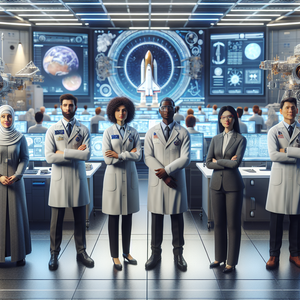
Navigating Exciting Career Avenues in the Thriving Space Sector: Roles, Skills, and Future Outlook
The space sector is currently experiencing an extraordinary shift, marked by rapid advancements and a heightened interest in exploration and innovation. With influential organizations like NASA, SpaceX, and various private enterprises expanding their horizons, now is an opportune moment to embark on a career in this dynamic arena. The variety of career paths ranges from engineering roles focused on spacecraft design and construction to scientific positions dedicated to interpreting data from distant celestial bodies.
Job Summaries:
Aerospace Engineer:
- These engineers play a pivotal role in designing, developing, and testing aircraft and spacecraft.
- They leverage principles of aerodynamics and materials science to devise innovative solutions for space exploration.
- Typically, candidates need a bachelor’s degree in aerospace engineering or a related discipline, alongside strong analytical skills and proficiency in CAD software.
Avionics Technician:
- Avionics Technicians specialize in electronic systems for aircraft and spacecraft.
- Responsible for installing, testing, and repairing critical navigation and communication systems.
- An associate degree or certification in avionics is often required.
Satellite Communications Engineer:
- These engineers design and implement satellite communication systems.
- Requiring a bachelor’s degree in telecommunications or electrical engineering.
- Experience in RF engineering is also needed.
Space Scientist:
- Engaged in research on celestial bodies
- Space Scientists analyze mission data
- Space Scientists design experiments
- A Ph.D. in a scientific discipline is typically needed
- Strong analytical skills are required
Mission Control Specialist:
- Mission Control Specialists monitor space missions to ensure that all systems function correctly and objectives are achieved.
- This role typically requires a background in engineering or physical sciences.
Space Systems Analyst:
- These analysts evaluate and optimize the performance of space systems
- Requiring a degree in systems engineering
- A strong analytical mindset
Robotics Engineer:
- Robotics Engineers design and develop robotic systems for space exploration.
- A degree in robotics or mechanical engineering is necessary.
- Programming skills are required.
Payload Specialist:
- Managing cargo and experiments aboard spacecraft
- Payload Specialists often have an engineering or science background
- Experience in project management
Space Operations Manager:
- These managers oversee the planning and execution of space missions.
- Coordinating between various teams.
- Typically, a degree in management or engineering is required.
Data Scientist in Space Applications:
- Data Scientists analyze data from space missions using machine learning and statistical methods.
- A background in data science or computer science is essential.
Spacecraft Mechanic:
- Responsible for maintaining and repairing spacecraft systems
- Spacecraft Mechanics typically need a vocational degree or apprenticeship in aerospace technology.
Astrobiologist:
- Astrobiologists investigate the potential for life beyond Earth.
- Astrobiologists often require a Ph.D. in biology or astrobiology.
- Astrobiologists need strong analytical skills.
Technical Writer for Space Programs:
- These writers create documentation for space missions
- Usually requiring a degree in communications or technical writing.
Space Policy Analyst:
- Space Policy Analysts research and analyze space-related policies and regulations.
- They advocate for sustainable exploration.
- A degree in political science or law is typically necessary.
Space Educator:
- Space Educators inspire future generations of scientists and engineers through educational programs
- Often requiring a teaching degree or experience in educational outreach.
Cybersecurity Specialist for Space Operations:
- Protecting sensitive data and systems from cyber threats is the focus of Cybersecurity Specialists.
- Cybersecurity Specialists typically have a background in cybersecurity or information technology.
Space Financial Analyst:
- These analysts manage budgets for space missions
- Requiring a degree in finance or accounting.
Environmental Scientist for Space Missions:
- Assessing the environmental impacts of space activities
- Environmental Scientists typically possess a degree in environmental science.
Launch Operations Technician:
- Launch Operations Technicians guarantee the readiness of launch vehicles
- Usually requiring a technical degree or relevant experience.
Commercial Space Pilot:
- Operating spacecraft for commercial purposes
- Commercial Space Pilots undergo extensive training and certification.
As the space industry continues to flourish, aspiring candidates can explore a multitude of pathways leading to fulfilling careers in space exploration. By aligning their skills and passions with the diverse opportunities available, they can play a meaningful role in humanity's quest to explore the cosmos. Whether you are a recent graduate or a professional considering a shift, the space sector is brimming with potential. Embrace the excitement of this field and take your first step toward a future among the stars!
Explore More Jobs

